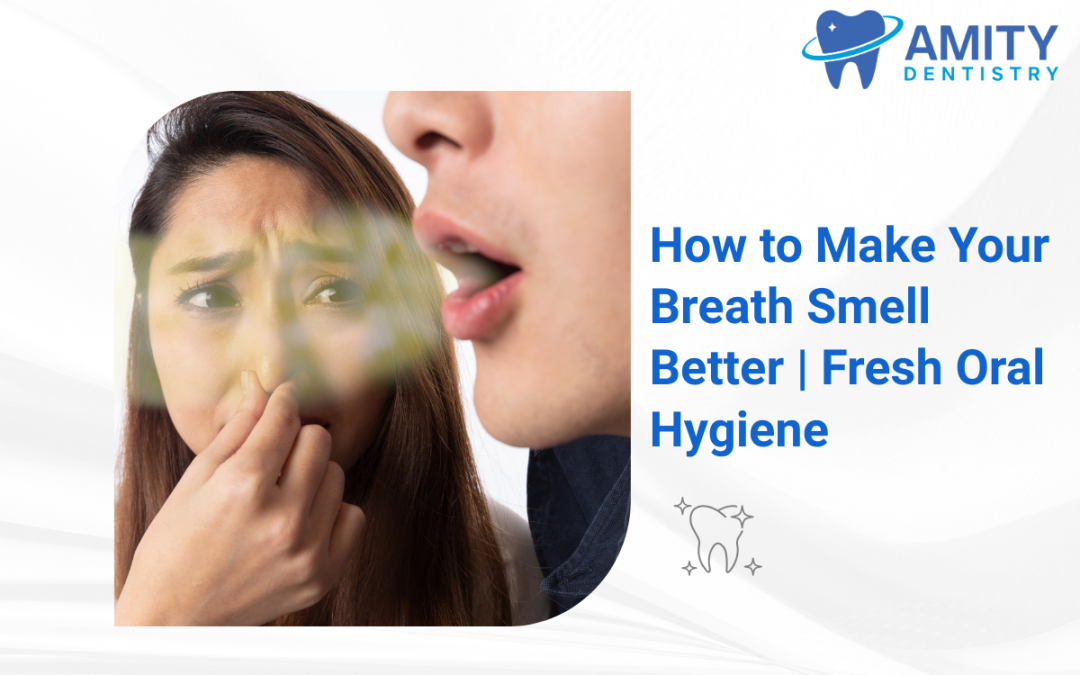Bad breath affects many people. It creates social anxiety and discomfort. You do not have to live with it. You have control over your oral health. This guide offers effective methods to fight bad breath. These fresh breath tips will help you build a routine for lasting results. Good oral hygiene is the foundation of a healthy mouth and pleasant breath.
Understanding the Causes of Bad Breath
Knowing the source of bad breath is the first step. The odor usually originates inside your mouth. Specific factors contribute to the problem. Identifying these causes helps you choose the right bad breath remedies.
Food Particles and Debris
When you eat, small pieces of food get trapped. They lodge between your teeth and along your gumline. Bacteria in your mouth feed on these particles. This process releases unpleasant smelling sulfur compounds.
Foods like garlic, onions, and certain spices are common culprits. Their oils enter your bloodstream after digestion. The oils travel to your lungs. You then exhale their odor. This type of bad breath is temporary. Proper cleaning removes the source.
Bacteria Buildup
Your mouth is home to millions of bacteria. Many are harmless. Some produce foul odors. These bacteria thrive on your tongue, especially on the back surface. They also live in the pockets around your teeth. Without regular dental checkup, these bacteria multiply.
They form a sticky film called plaque. Plaque contributes directly to bad breath. It also leads to tooth decay and gum disease. A consistent oral hygiene routine is your main defense against this bacterial buildup.
Dry Mouth
Saliva is essential for a clean mouth. It washes away food particles. It neutralizes acids produced by plaque. Saliva also contains substances which fight germs. When your mouth produces less saliva, it becomes dry. This condition is called xerostomia. A dry mouth allows bacteria to grow quickly. This leads to significant bad breath. Mouth breathing, certain medications, and some health conditions cause dry mouth.
Poor Oral Hygiene A weak oral hygiene routine is a primary cause of bad breath. Infrequent or improper brushing leaves food and plaque behind. Skipping flossing allows plaque to harden into tartar. Tartar traps more bacteria and must be removed by a dental professional. Neglecting to clean your tongue also allows odor-causing bacteria to accumulate. Excellent oral hygiene is the most direct of all bad breath remedies.
Tobacco Use
Smoking and chewing tobacco introduce chemicals into your mouth. These substances create a distinct, stale odor. Tobacco use also dries out your mouth. It increases your risk of gum disease. Gum disease is another major source of bad breath. Quitting tobacco offers numerous health benefits. Fresher breath is one of the most immediate ones.
Why It Is Important to Develop Daily Habits for Better Breath?
You can build daily habits to ensure fresh breath. Consistency is important. These fresh breath tips are simple to add to your daily schedule. They form the core of a strong oral hygiene program.
Brush Your Teeth Correctly
Brush your teeth twice each day. Spend two full minutes on each session. Use a soft-bristled toothbrush. A soft brush cleans effectively without damaging your gums. Apply a fluoride toothpaste. Fluoride strengthens your tooth enamel and fights decay.
Hold your brush at a 45-degree angle to your gums. Use short, gentle strokes. Clean the outer, inner, and chewing surfaces of every tooth.
Pay close attention to the gumline where plaque accumulates. An electric toothbrush helps many people clean more thoroughly. Remember to replace your toothbrush or brush head every three to four months. Worn bristles do not clean properly.
Do Not Forget to Floss
Brushing alone cannot clean everywhere. It misses the tight spaces between your teeth. Flossing removes trapped food and plaque from these areas. You should floss at least once a day.
Use about 18 inches of floss. Wind most of it around one middle finger. Wind the rest around the other middle finger. Hold the floss tightly between your thumbs and forefingers. Guide the floss between your teeth using a gentle rubbing motion.
Never snap the floss into your gums. When the floss reaches the gumline, curve it into a C shape against one tooth. Slide it gently into the space between the gum and the tooth. Floss both sides of every tooth.
Clean Your Tongue
Your tongue has a rough surface with many tiny grooves. These grooves trap bacteria and food particles. This buildup is a major source of bad breath. Cleaning your tongue daily makes a noticeable difference.
You can use a tongue scraper. This tool is designed specifically for this task. You can also use the back of your toothbrush. Many toothbrushes have a built-in tongue cleaner.
Start at the back of your tongue. Gently pull the scraper or brush forward to the tip. Rinse the tool after each pass. This action removes the bacterial film.
Use a Therapeutic Mouthwash
Mouthwash can be a helpful addition to your routine. It is not a substitute for brushing or flossing. Look for a therapeutic, alcohol-free mouthwash.
Therapeutic mouthwashes contain agents which reduce plaque and kill bacteria. An alcohol-free formula prevents your mouth from drying out.
Rinse your mouth after brushing and flossing. Swish the mouthwash for the time recommended on the label, usually 30 seconds.
This helps wash away any remaining debris. It also gives your breath a fresh scent. Using mouthwash is one of the quickest fresh breath tips for an immediate clean feeling.
Stay Hydrated with Water
Water is critical for good oral hygiene. It helps keep your mouth moist. Drinking water throughout the day rinses away food particles. It helps prevent dry mouth. A hydrated mouth produces enough saliva to manage bacteria levels.
Choose water over sugary drinks. Sodas, juices, and sports drinks contain sugars which feed odor-causing bacteria. These drinks also contribute to tooth decay.
Make water your primary beverage for better overall health and fresher breath. This is one of the simplest bad breath remedies available.
Lifestyle and Diet Adjustments
Your daily choices affect your breath. Certain foods and habits create odor. Others help keep your mouth fresh. Small changes in your diet and lifestyle support your oral hygiene efforts.
Choose Your Foods Wisely
Some foods are known for causing bad breath. Onions and garlic are the most common examples. Their pungent oils linger in your mouth and are absorbed into your body. Limiting these foods helps manage your breath.
Eat foods which clean your teeth naturally. Crunchy fruits and vegetables act like natural toothbrushes. Apples, carrots, and celery scrub your teeth as you chew them. They also stimulate saliva flow.
A balanced diet low in sugar supports a healthy mouth environment. Foods rich in Vitamin C, like citrus fruits and peppers, help fight gum disease.
Chew Sugar-Free Gum
Chewing gum after a meal offers benefits. The chewing action stimulates your salivary glands. Increased saliva flow washes away food and neutralizes plaque acids. This helps your mouth clean itself.
Always choose a sugar-free gum. Gums containing sugar will feed the bacteria you are trying to fight. Look for gums sweetened with xylitol. Xylitol is a natural sweetener which helps reduce bacteria in the mouth. Chewing sugar-free gum is a convenient way to freshen your breath on the go.
Avoid All Tobacco Products
If you use tobacco, make a plan to quit. This is a significant step for your oral health. Tobacco stains your teeth, causes gum disease, and leads to oral cancer. It is also a persistent source of bad breath. Eliminating tobacco provides immediate and long-term improvements to your breath and health. Your doctor or dentist in Charlotte NC can provide resources to help you quit.
Limit Coffee, Alcohol, and Sugary Drinks
Coffee and alcoholic beverages create a favorable environment for bacterial growth. They contribute to dry mouth. This reduces your saliva’s cleaning power. When you drink these beverages, follow them with a glass of water. This helps to rinse your mouth and restore moisture. Sugary drinks also fuel bacteria. Reducing your intake of soda and sweet tea is a good practice for your oral hygiene.
The Role of Professional Dental Care
Excellent home care is the foundation of fresh breath. Professional dental visits are also essential. Some oral hygiene issues require a dentist’s help. Tartar buildup is a prime example. Regular checkups ensure your mouth stays healthy.
Why Regular Checkups Matter?
Even with careful brushing and flossing, you will miss some plaque. Over time, this plaque hardens into a substance called tartar, or calculus.
Tartar cannot be removed with a toothbrush. It must be removed by a dental professional during a dental cleaning. Tartar buildup leads to gum inflammation and contributes to bad breath.
During a regular checkup, your dentist examines your teeth and gums. This examination identifies potential problems early.
Finding and treating issues like cavities or gum disease prevents them from becoming more serious. Your dentist offers personalized advice on your oral hygiene routine.
The Benefits of a Professional Dental Cleaning
A professional dental cleaning is one of the most effective bad breath remedies. The procedure is thorough. A dental hygienist uses special tools to perform scaling. Scaling removes all the plaque and tartar from your teeth, both above and below the gumline.
After scaling, the hygienist polishes your teeth. Polishing removes surface stains. It leaves your teeth smooth and shiny. A smooth surface makes it harder for new plaque to attach. A professional dental cleaning gives you a clean slate.
It greatly improves your breath. It also supports the health of your gums. Most dentists recommend dental cleaning every six months.
Your Partner in Oral Health in Pineville
Persistent bad breath is a reason to see your dentist. If you have tried these fresh breath tips without success, a professional evaluation is necessary. Your dentist will determine the cause of the problem.
If you are concerned about your breath, a professional dental cleaning is a powerful step. The team at Amity Dentistry can help. As a trusted Pineville dentist, we provide thorough cleanings. We offer personalized advice for your oral hygiene. We listen to your concerns and create a plan for your health. Schedule a visit to maintain your oral health. A professional dental cleaning helps you achieve lasting fresh breath. A Pineville dentist at our practice is ready to assist you.
You can achieve fresh breath. The solution lies in consistent daily habits and regular professional care. Start with small changes to your oral hygiene routine.
Brush and floss correctly every day. Clean your tongue. Drink plenty of water. Pay attention to your diet. These actions form a strong defense against bad breath.
Combine your home efforts with regular visits to your dentist. A professional dental cleaning removes stubborn tartar and keeps your mouth healthy. You have the tools to improve your breath. Start with these simple changes today to build confidence in your smile. Ready to improve your smile in Charlotte? Contact our expert team at 980-423-1244 and Book Now for dental care.

